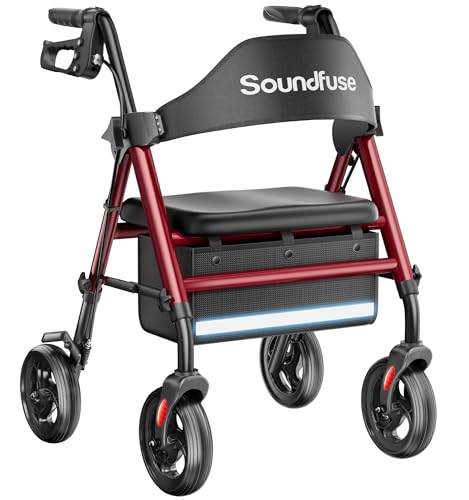As we get older, our bodies may not be as agile and energetic as they used to be.
But that doesn’t mean we have to give up our independence and freedom to move around.
With the help of a rollator walker, also known as a rolling walker, walkers and rollators, or mobility aid, we can still get around with ease and grace.
But with so many different types of rollator walkers out there, how do you choose the best one for your needs?
Don’t worry, we’ve got you covered! In this article, we’ll go over everything you need to know to choose the right rollator walker for you.
From the different types of rollator walkers, to the features to look for, and even how to test them out, we’ll help you make the right choice.
Whether you need a rollator walker for indoor and outdoor use, a heavier duty one for better support, or one with a convenient seat to rest on, we’ve got all the information you need to find the best rollator walker for your needs.
So let’s get started and roll our way to better mobility!
Considerations before choosing a rollator walker
Before you start browsing through the different types of rollator walkers, it’s important to consider a few key factors that will impact your choice. Here are some things to think about:
Mobility needs and limitations
Considering your current level of mobility is key when selecting the right kind of rollator walker.
Are you in need of one following a recent medical event or injury? Or, do you suffer from a chronic condition that affects your ability to get around?
Knowing exactly what type of mobility support you need will help you make the best decision for your situation.
Physical abilities
Your physical abilities will also play a role in choosing the right rollator walker.
Do you have good upper body strength to push and maneuver a rollator walker? Or do you need a rollator walker that is lighter weight and easier to handle?
These are important factors to consider when selecting a rollator walker.
Lifestyle
Your lifestyle will also impact your choice of rollator walker.
Do you plan to use your rollator walker mainly indoors, outdoors, or both? Do you need a rollator walker that is easy to fold and store?
These are important lifestyle factors to consider when selecting a rollator walker.
Environment
The environment in which you plan to use your rollator walker is also important to consider.
Do you need a rollator walker with larger wheels for outdoor terrain? Or do you need a rollator walker with smaller wheels for tighter indoor spaces?
Understanding your environment will help you choose a rollator walker that meets your needs.
Budget
Finally, you need to consider your budget when choosing a rollator walker.
Rollator walkers come in a range of prices, from basic models to more advanced ones with additional features.
It’s important to find a rollator walker that fits your budget while also meeting your needs.
Types of Rollator Walkers
Now that you’ve weighed up the various aspects of your mobility, physical capabilities, lifestyle, surroundings and budget, it’s time to look into the different kinds of rollator walkers that are out there.
Here are a few of the most popular versions:
Standard Rollators
Standard rollators are the most common type of rollator walker.
They typically have four wheels, a padded seat for a convenient place to rest, and a backrest.
Standard rollators also come equipped with hand brakes to help control the rollator’s speed and movement.
They are often height adjustable and foldable for easy storage.
Three-Wheel Rollators
Three-wheel rollators are similar to standard rollators, but they have three wheels instead of four.
This makes them more maneuverable and easier to turn in tight spaces.
Three-wheel rollators also tend to be lighter weight than four-wheel rollators, making them a better option if you need a rollator walker that is easier to handle.
Four-Wheel Rollators
Four-wheel rollators are the most common type of rollator walker.
They are similar to standard rollators, but they have four wheels instead of three.
Four-wheel rollators are more stable than three-wheel rollators, making them a good choice if you need more support when using your rollator walker.
Heavy-Duty Rollators
Heavy-duty rollators are designed for users who need extra support and stability.
They are typically larger and sturdier than standard rollators, and they have weight capacities that are higher than those of standard rollators.
Heavy-duty rollators also tend to have larger wheels, making them a good option for outdoor use.
Rollator Transport Chair
These are a hybrid between a rollator walker and a transport chair.
They can be used as a rollator walker when you need support while walking, but they can also be converted into a transport chair when you need to be pushed by someone else.
Rollator transport chairs are a good option if you need both a walking aid and a transport chair.
Each type of rollator walker has its own unique features and benefits, so it’s important to choose the one that best fits your needs.
Features to Look for in a Rollator Walker
Once you’ve decided on the type of rollator walker that best fits your needs, it’s time to look at the specific features that will make your rollator walker even more useful and convenient.
Here are some important features to look for in a rollator walker:
Adjustable Handle Height
Adjustable handle height is an important feature for any rollator walker.
It allows you to adjust the height of the handles to match your own height, making it easier to push and maneuver your rollator walker.
Seat and Backrest
If you plan to use your rollator walker for longer periods of time, a seat and backrest can be a real lifesaver.
Look for a rollator walker with a comfortable padded seat and a backrest for extra support and comfort.
Brakes
All rollator walkers come equipped with brakes, but the type of brakes can vary.
Hand brakes are the most common type of brake, and they are located on the handles of the rollator walker.
Some rollator walkers also come equipped with loop brakes, which are located on the frame of the rollator walker.
Wheels and Tires
The wheels and tires on your rollator walker will determine how easy it is to maneuver and use.
Look for a rollator walker with large wheels for outdoor use, or smaller wheels for indoor use.
You should also consider the type of tires on your rollator walker, as some tires are better suited for certain terrains than others.
Foldability and Storage
If you’re taking your rollator on the road, make sure it folds up easily into a small package.
Many rollator models can be collapsed down to fit snugly in your car or house.
Make sure to find one that’s both compact and convenient – perfect for any journey!
Accessories
Finally, consider any additional accessories that might be useful for your rollator walker.
These might include a storage bag or basket, a cup holder, or even a tray for carrying items.
Think about what would make your rollator walker even more useful and convenient, and look for a rollator walker that comes equipped with these accessories or can be easily modified to include them.
How to Test a Rollator Walker
Before finalizing your purchase of a rollator walker that matches your requirements, it’s critical to trial it. Here are several decisive factors you should bear in mind while testing a rollator walker:
Height and Weight Capacity
Make sure that the rollator walker is the right height for you, and that it can support your body weight.
Check the weight capacity of the rollator walker before making a purchase, and make sure that it can support your body weight comfortably.
Maneuverability
Test the maneuverability of the rollator walker by pushing it around in the store.
Ensure that it’s easy to turn and maneuver, and that it’s comfortable to push and steer.
Stability and Balance
Check the stability and balance of the rollator walker by walking with it and making sure that it doesn’t tip over.
Make sure that it feels stable and balanced, and that you feel comfortable and safe while using it.
Comfort and Fit
Make sure that the rollator walker is comfortable and fits your body well.
Check the seat and backrest for comfort, and make sure that the handles are at the right height for you.
Ease of Use
Finally, test the rollator walker for ease of use.
Make sure that it’s easy to fold and store, and that it’s easy to use on a daily basis.
Check that the brakes are easy to operate, and that the rollator walker is easy to adjust and modify to your specific needs.
Where to Buy a Rollator Walker
Now that you’ve chosen the best rollator walker for your needs and tested it out to ensure it’s the right fit, it’s time to make your purchase. But where should you buy your rollator walker?
Here are some options to consider:
Local Medical Supply Stores
For those seeking assistance in purchasing a rollator walker, local medical supply stores carry a wide variety of options and are ready to help you pick the perfect model for your individual needs.
It’s possible that they may even have financing or insurance opportunities available.
Online Retailers
Take the hassle out of shopping for rollator walkers and trust online retailers like Amazon and Walmart—they offer a wide range of products so you can compare prices and read reviews from other customers.
Just make sure you’re purchasing from a trusted source to ensure you get the perfect product for your needs!
Medicare and Insurance Coverage
Has Medicare or insurance? You could be eligible for a rollator walker at little to no expense.
Check in with your provider to find out what’s included in your coverage and which walkers are available for you.
Regardless of where you choose to buy your rollator walker, make sure that you’re getting a high-quality product that meets your needs and is comfortable and safe to use.
Conclusion
Choosing the best rollator walker for your needs can be a daunting task, but by considering your mobility needs and limitations, physical abilities, lifestyle, environment, and budget, you can find the perfect rollator walker for you.
Look for a rollator walker with the right features, test it out before making a purchase, and choose a reputable retailer to buy from.
With the right rollator walker, you can enjoy greater independence and freedom to move around with ease and grace.
FAQs
What is the difference between a rollator walker and a standard walker?
Rollator walkers have wheels, while standard walkers do not. Rollator walkers also typically come equipped with a seat and backrest, as well as hand brakes.
Standard walkers require more upper body strength to operate, while rollator walkers are more stable and easier to use.
How do I know if I need a rollator walker or a standard walker?
Your physical abilities and mobility needs will determine whether a rollator walker or a standard walker is best for you. If you need more support when walking or have difficulty balancing, a rollator walker may be the better option.
If you have good upper body strength and prefer a more basic walking aid, a standard walker may be a better choice.
Can a rollator walker be used outdoors?
Yes, many rollator walkers are designed for outdoor use. Look for a rollator walker with larger wheels and sturdy tires for outdoor terrain.
How do I adjust the height of my rollator walker?
Most rollator walkers come equipped with adjustable handle height.
Look for a button or lever on the frame of the rollator walker that allows you to adjust the height of the handles.
Some rollator walkers may require the use of a tool to adjust the handle height.
Do I need a rollator walker with a seat and backrest?
A rollator walker with a seat and backrest can be a real lifesaver if you plan to use your rollator walker for longer periods of time.
It provides a comfortable place to rest and can help prevent fatigue and discomfort.
However, if you only plan to use your rollator walker for short periods of time or for quick trips, a seat and backrest may not be necessary.









